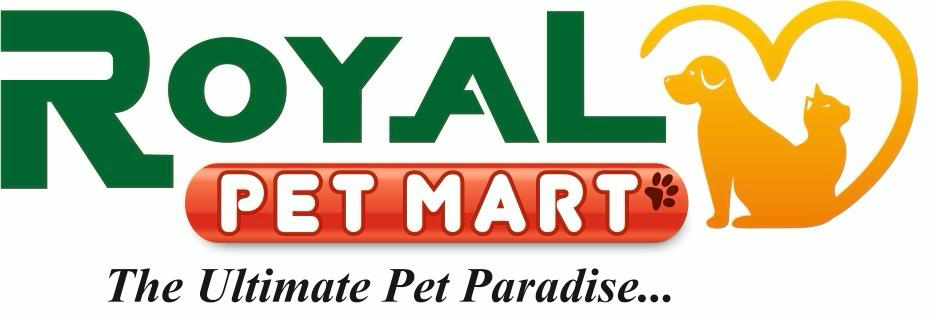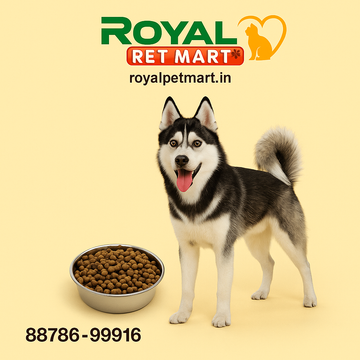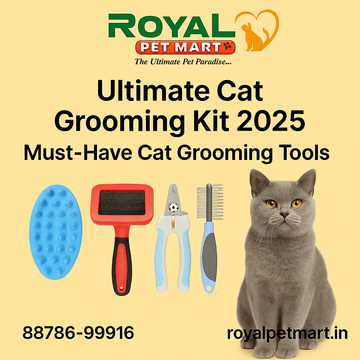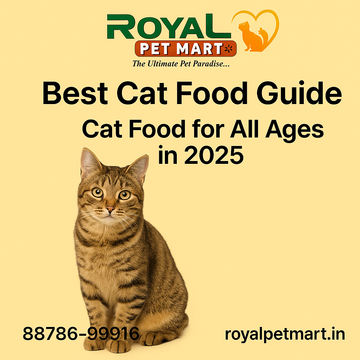Puppy Parents: Here’s What You MUST Know About Starter Food and Puppy Nutrition!
by Royal Pet mart on May 06, 2025

Introduction
Hey there, fellow puppy parents—welcome to the most amazing, chaotic, and love-filled journey you’ll ever experience! I can still recall the day I brought Luna, my little golden retriever, home. She was a tiny ball of fluff with the biggest eyes, and I was in love ~but I did not know how much I needed to learn about puppy nutrition. Those first couple of months are everything in regard to helping your pup grow strong and healthy, and a healthy puppy diet food can make a huge impact. I made a lot of mistakes along the way, but after some vet recommendations and plenty of trial and error, I figured out the best way to give Luna a great start. In this blog, I am going to share what I wish I had known about starter puppy food, puppy nutrition, feeding schedules, and more, so that you can give your pup a lifetime of happiness.
Why Puppy Nutrition is Crucial
I’ll never forget the moment Luna’s vet pulled me aside during her first checkup and said, “What you feed her now will shape her entire life.” That hit me hard. Puppy nutrition isn’t just about filling their belly—it’s about fueling their puppy growth and development. Luna was growing so fast, practically doubling in size every few weeks, and she needed the right nutrients to build strong bones, muscles, and organs.
A good diet also helps with puppy nutrition for immunity. Puppies are so vulnerable when they’re little, and the right food strengthens their immune system to fight off sickness. I saw this firsthand—once I got Luna on a better diet, she stopped getting those little sniffles she used to have all the time. But it’s not just about their body—it’s their whole life. A healthy puppy diet sets the foundation for their long-term health and even their behavior. Luna used to be so fussy and low-energy when I wasn’t feeding her right, but once I fixed her diet, she turned into the playful, happy pup she is today. Getting puppy health and nutrition right early on is one of the best things you can do for your furry friend.
Understanding Starter Food for Puppies
When Luna first came home, I thought she’d just keep drinking her mom’s milk forever—I had no clue about starter food for puppies! But around 3–4 weeks old, puppies need to start moving from milk to solid food, and that’s where starter food comes in. Starter food for puppies is like a bridge—it’s soft, easy to chew, and packed with nutrients to help them grow while they’re still figuring out how to eat solids.
I started Luna on starter food at 4 weeks, soaking some wet puppy food in warm water to make it mushy—she went crazy for it! It was so cute watching her little tongue lap it up, but I made sure to go slow with the puppy food transition. Over a few weeks, I mixed in more solid kibble until she was fully weaned off milk by 8 weeks. That gradual switch kept her tummy happy, and it was such a relief to see her take to what to feed a new puppy so well. If you’re looking for good starter food, Royal Pet Mart has some awesome options—I found a few there that Luna loved, and they made the whole process so much easier.
Essential Nutrients for Puppies
I’ll be honest—I didn’t think much about nutrients until Luna’s vet broke it down for me. Puppies need specific essential nutrients for puppies to grow up healthy, and once I understood what to look for, I felt so much more confident feeding Luna the right way.
First up, proteins are a must—they’re the building blocks for growth and energy. Luna’s food needed a minimum of 22% protein to support her tiny muscles and she enjoyed chicken or fish. Fats are equally as important, especially DHA, an omega-3 fatty acid that supports her brain and eye development. I could tell that was working - Luna’s eyes were so bright, and she was so alert as a puppy. Calcium and phosphorus are nonnegotiables for bone strength, and goldens can have joint concerns later in life. Luna required vitamins or minerals such as vitamin A, D, and zinc to enhance her puppy nutrition for immunity and assist her puppy diet for digestion and no more upset tummies! And of course, water - I always provided a fresh bowl of water for her because hydration is critical for a growing puppy. Carefully selecting the nutrients and taking care of the foundations of Luna’s healthy puppy diet made such a difference in her growth!
Types of Puppy Food
Picking the right type of puppy food felt like a huge decision at first, but I learned it’s really about what works for your pup and your life. I tried a few different kinds with Luna, so here’s the scoop on wet vs dry puppy food and even fresh meals.
I started with wet food because it’s soft and smells amazing to puppies—Luna couldn’t get enough of it when she was tiny. It’s also easier to digest, which was great for her little tummy, but it’s messier and doesn’t last as long once you open it. Then I moved to dry food (kibble), which I got from Royal Pet Mart—it’s super convenient, lasts forever, and helps keep her teeth clean by scraping off plaque as she chews. The downside is some pups don’t love the taste as much as wet food. I even tried making homemade or fresh meals for a short time by making some chicken and veggies mixes for Luna herself for a super healthy diet, but let's be honest, it took a fair bit of time and care on my part to ensure she was balanced with all of her different nutrients.
Each option has its pros and cons, so think about your dog’s needs (tiny dog, puppy food is great for small breeds) and your time. I ended up mixing wet and dry for Luna so she would get excited for mealtime and I would not have to worry about, or as much about the mess. If you are ever confused about how to get puppy food - just ask your vet! They'll help you determine what's best for your dog's breed and one lifestyle.
Puppy Feeding Schedule & Puppy Food Portion Sizes
One of the best things I did for Luna was set up a puppy feeding schedule—it kept her energy steady and stopped those hungry puppy cries that broke my heart. Here’s what I learned about feeding frequency and puppy food portion sizes from 0 to 12 months.
When Luna was 0–3 months, I fed her 4 small meals a day—she was so little and needed constant fuel for all that growing and zooming around. From 3–6 months, I cut back to 3 meals as she got a bit bigger and could handle more at once. By 6–12 months, we settled into 2 meals a day, which she still gets now as an adult. Figuring out how much to feed was trickier—it depends on your pup’s size and age. Luna’s food bag had a chart, but as a rough guide, a 10-pound puppy might need about 1 cup of kibble a day, split across meals. I always looked for indications of overfeeding or underfeeding; if Luna had food left in her bowl or appeared hungry and whining - I would adjust her portions. If you overfeed a pup they can get fat, which is bad for their joints, and if you underfeed them, it can delay their growth, so keep an eye on their weight and energy. As Luna grew larger, I simply adjusted her portions based on the feedback from her needs, and my Vet helped me make sure her puppy growth and development was on track.
Common Puppy Feeding Mistakes
I’ll admit, I made some puppy feeding mistakes with Luna in the beginning, and I don’t want you to go through the same headaches. One of my biggest slip-ups was feeding adult dog food too early—I thought it wouldn’t matter, but puppies need way more calories and nutrients than adult dogs, so wait until they’re fully grown (around 1 year for small breeds, 2 for bigger ones). Another mistake was lack of balanced nutrients—Luna’s first food was a cheap brand that didn’t have enough vitamins, and I could tell because her coat looked dull and she was always tired.
I also messed up by not reading food labels—I didn’t realize some foods had fillers like corn that upset her tummy until it was too late. And giving too many treats or human food was my guilty pleasure—Luna loved sneaking bites of my toast, but it gave her the worst diarrhea, so I had to stop. Learning from these mistakes helped me get Luna’s healthy puppy diet back on track, and I hope sharing them helps you avoid the same hiccups.
Vet-Recommended Puppy Food Brands
As I began the process of finding what food was best for puppies beginning their diet, I consulted my vet, who provided some recommendations. I discovered some fantastic brands like Royal Canin, Hill’s science Diet, and Purina Pro Plan. All meet AAFCO nutritional guidelines and use quality ingredients, including actual real meat and veggies. I was able to also find Wellness Core, they have a small breed puppy food formula that Luna gobbled up when I put it in her wet food. As you shop, make sure you check for things like protein, DHA, calcium levels, and to ensure there are no artificial ingredients. Royal Pet Mart has all these brands, and I love their selection of puppy food brands at Royal Pet Mart—it made finding the right food for Luna so easy.
Transitioning Puppy to Adult Food
As Luna got closer to her first birthday, I knew it was time to start transitioning puppy to adult food. The timing depends on your dog’s size—small breeds can usually switch around 10–12 months, while bigger breeds like goldens might need to wait until 18–24 months. I started Luna’s puppy food transition at 11 months, mixing a little adult food into her puppy kibble and slowly increasing the amount over about 10 days. This gradual introduction was key to avoiding tummy troubles—she had a little loose stool at first, but it settled down quickly.
I kept a close eye on her during the change, watching for any signs of low energy, coat changes, or tummy upset, and I checked in with my vet to make sure her puppy's health and nutrition wasn’t taking a hit. It felt like such a milestone watching Luna grow into an adult dog, and I was so proud of how strong and healthy she’d become thanks to her healthy puppy diet.
Conclusion
Being a puppy parent is the best kind of chaos, and getting puppy nutrition right from the beginning is one of the most important things you can do for your pup. From figuring out starter food for puppies to making sure they get all the essential nutrients for puppies, setting a puppy feeding schedule, and avoiding puppy feeding mistakes, you’re giving your pup the best shot at a long, happy life. Be consistent, choose vet-recommended puppy food from places like Royal Pet Mart, and don’t hesitate to talk to your vet if you’re ever unsure. Your pup’s future's so bright—take the time to pick the best food for them now, and watch them grow into the most amazing dog you’ve ever known!




